Data Architect Resume Examples

Jul 18, 2024
|
12 min read
Building your future: craft a standout data architect resume brick by brick with these essential tips.
Rated by 348 people
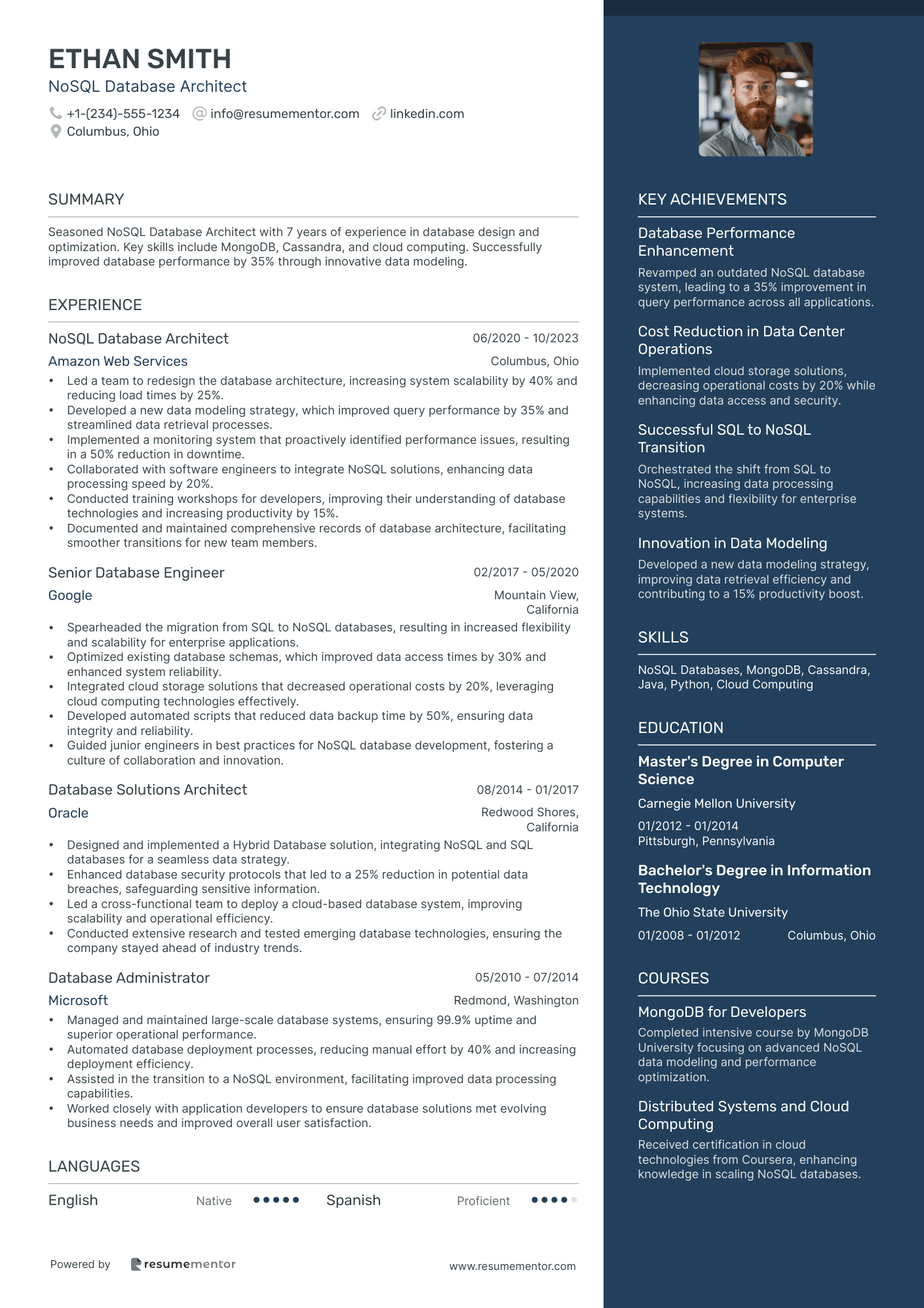
NoSQL Database Architect
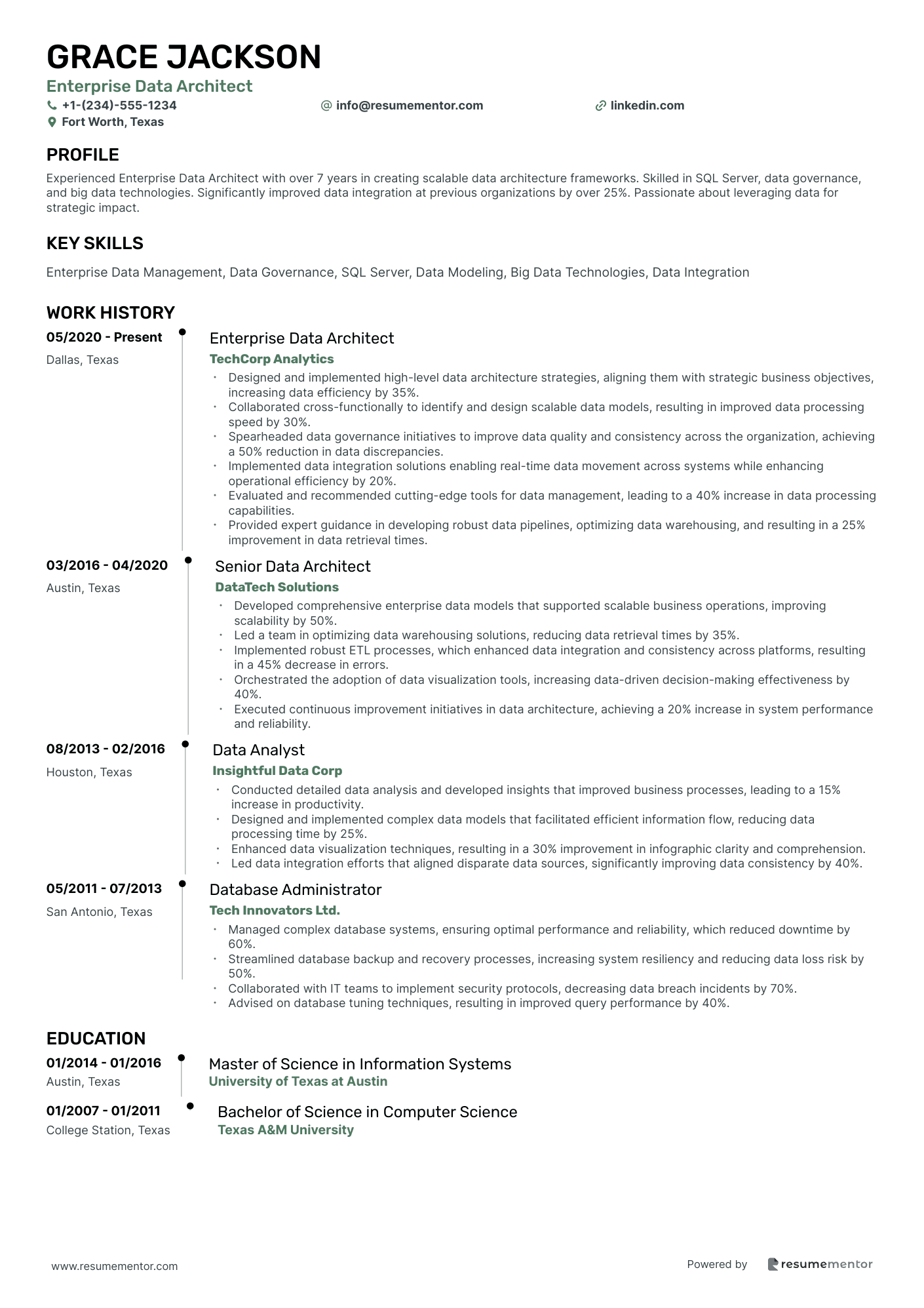
Enterprise Data Architect
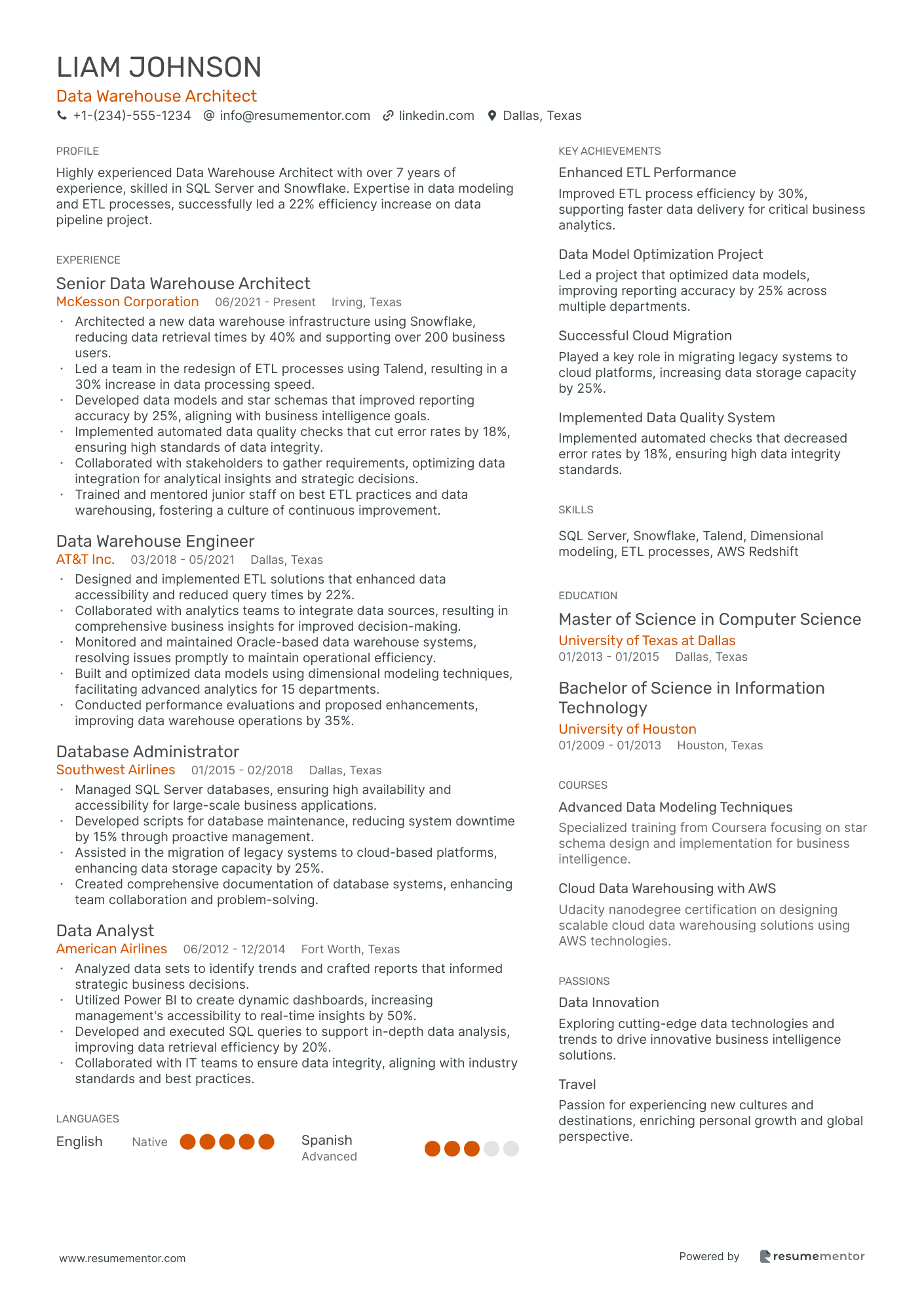
Data Warehouse Architect
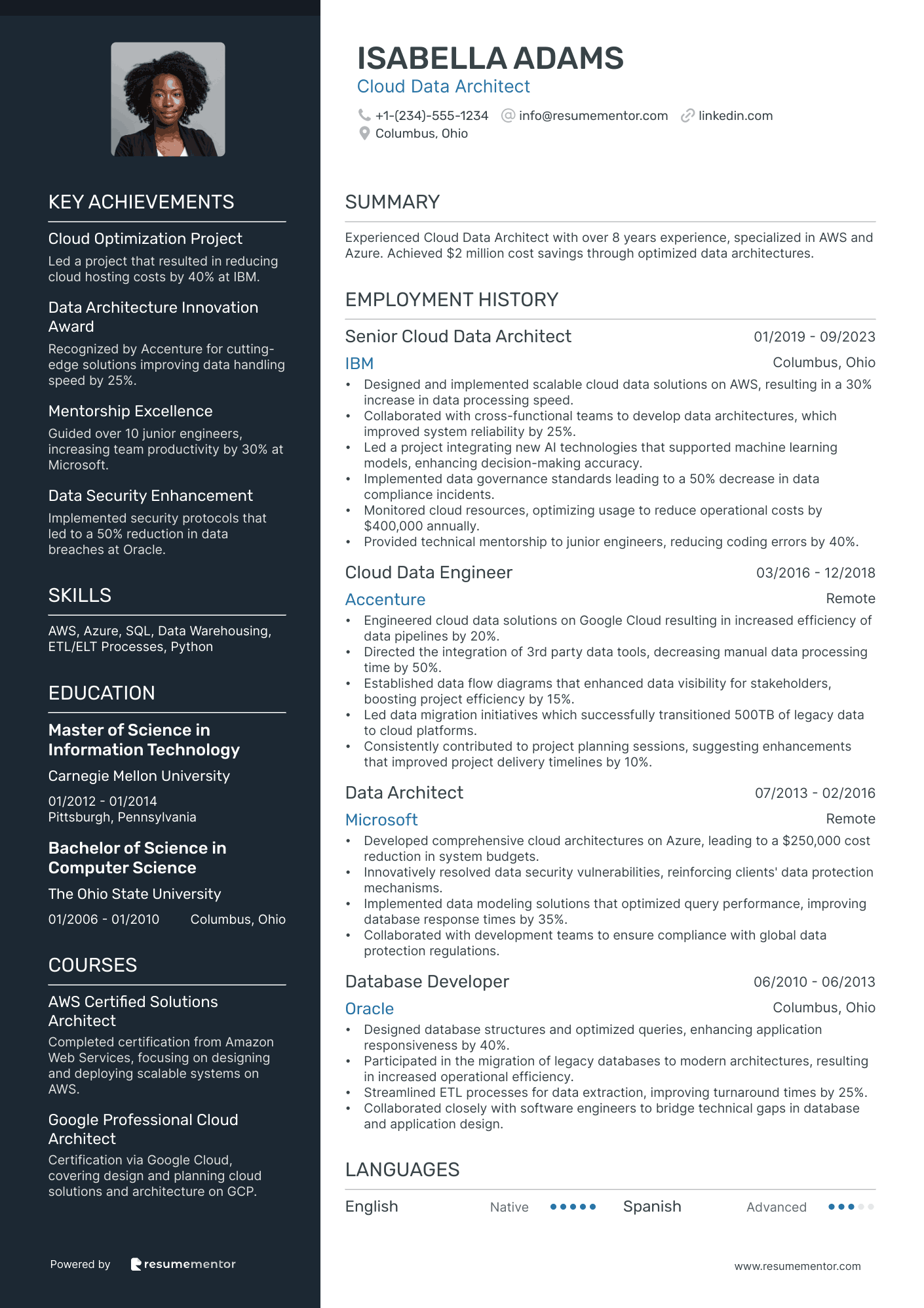
Cloud Data Architect
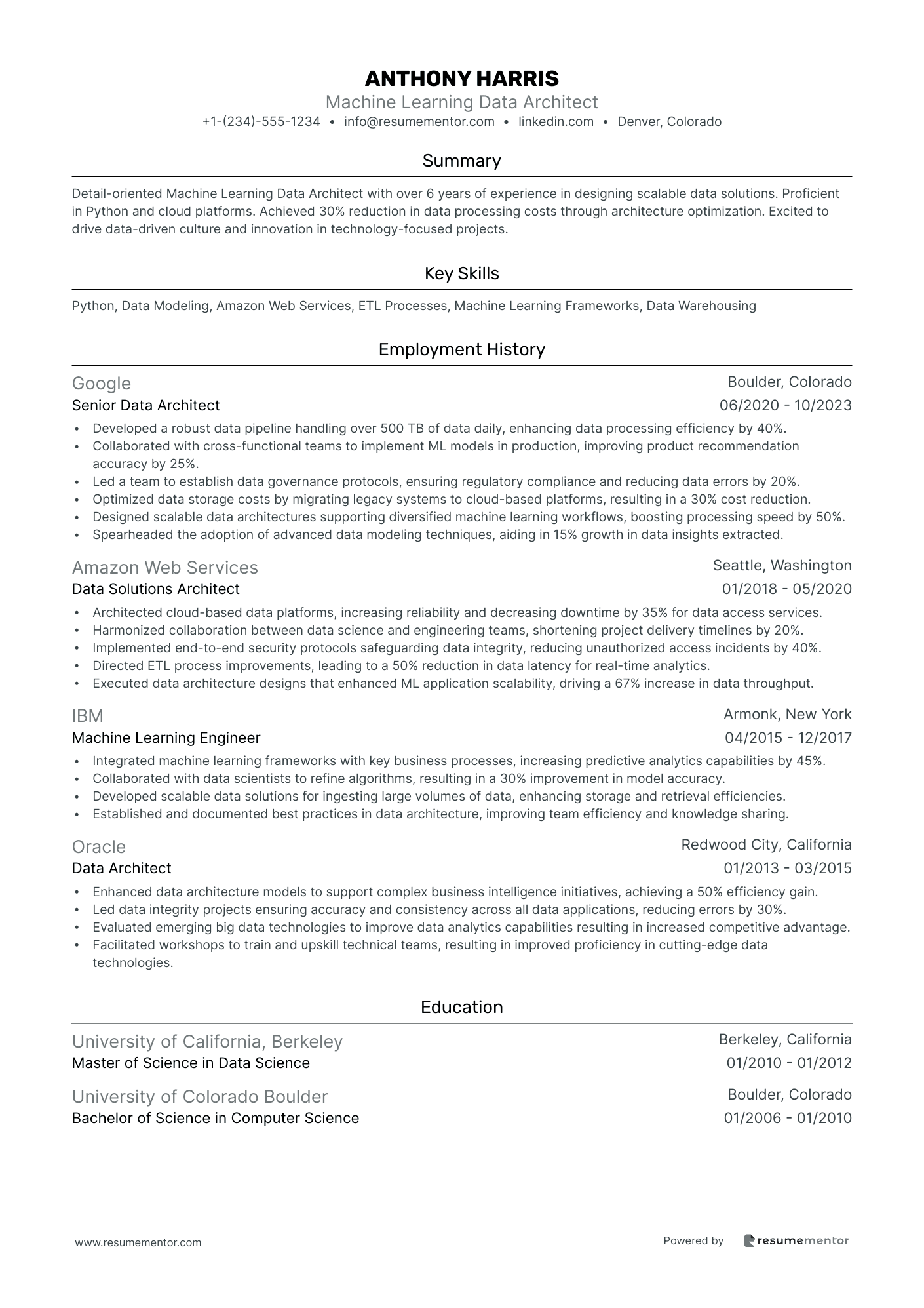
Machine Learning Data Architect
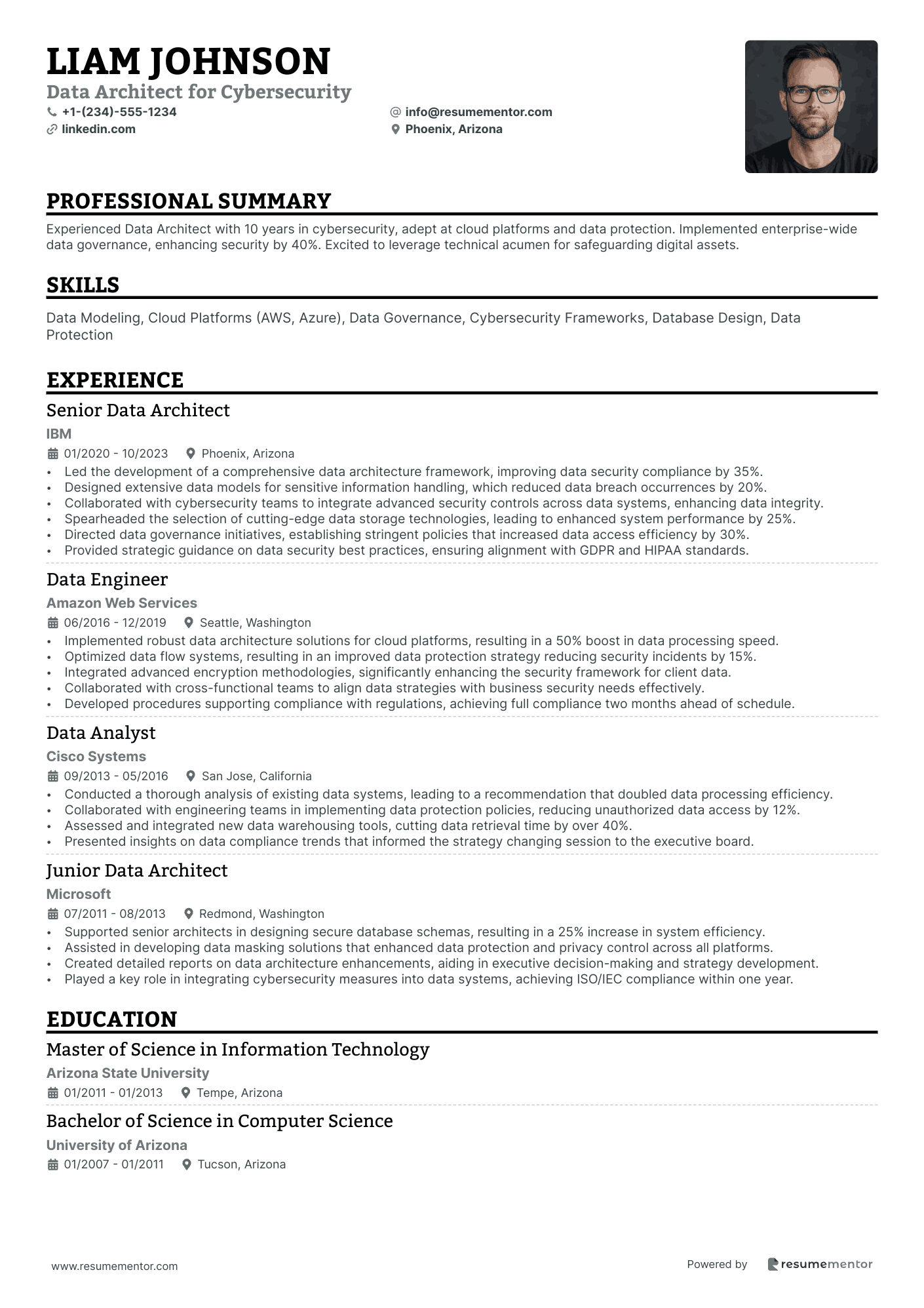
Data Architect for Cybersecuity
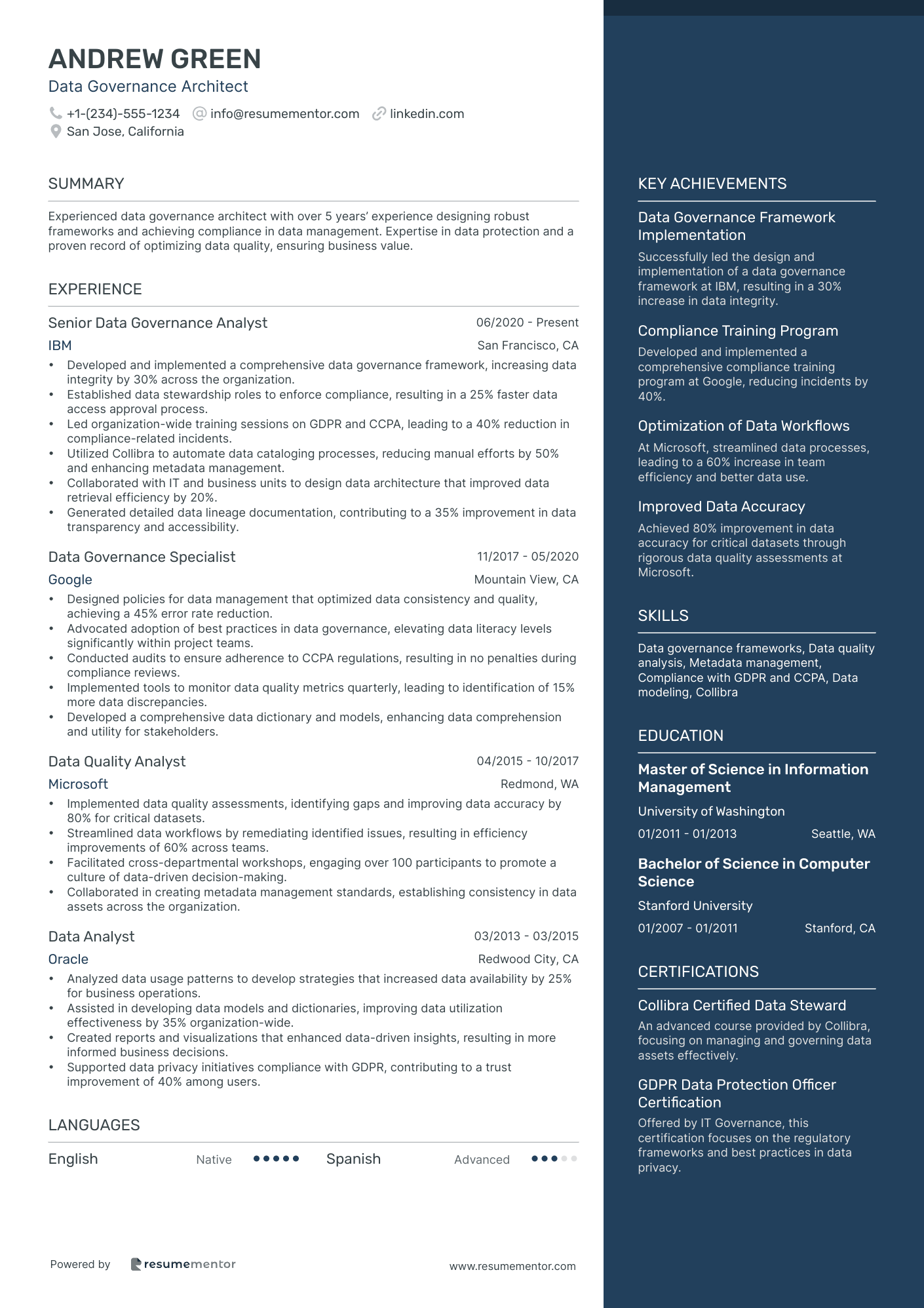
Data Governance Architect
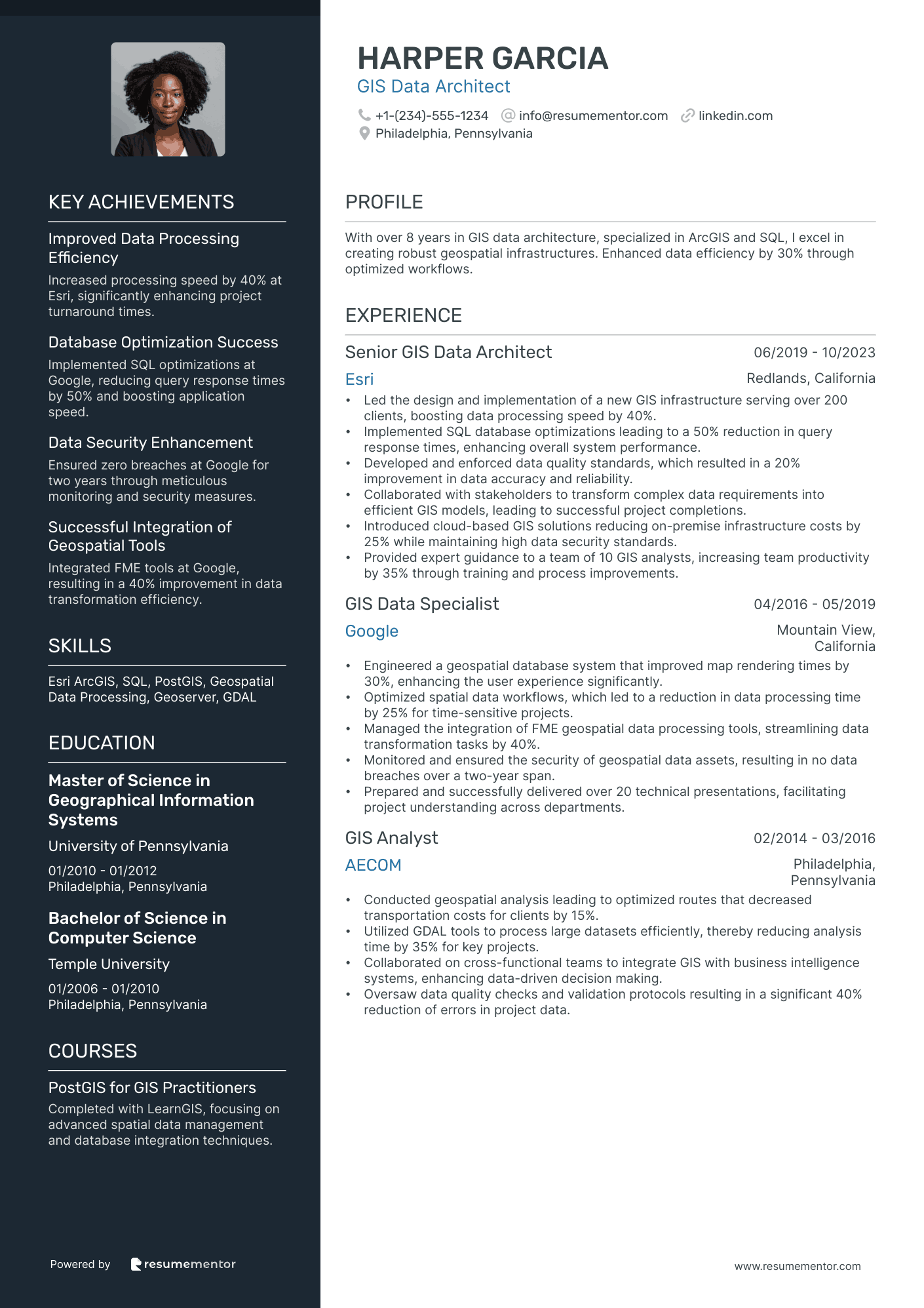
GIS Data Architect

NoSQL Database Architect resume sample
- •Led a team to redesign the database architecture, increasing system scalability by 40% and reducing load times by 25%.
- •Developed a new data modeling strategy, which improved query performance by 35% and streamlined data retrieval processes.
- •Implemented a monitoring system that proactively identified performance issues, resulting in a 50% reduction in downtime.
- •Collaborated with software engineers to integrate NoSQL solutions, enhancing data processing speed by 20%.
- •Conducted training workshops for developers, improving their understanding of database technologies and increasing productivity by 15%.
- •Documented and maintained comprehensive records of database architecture, facilitating smoother transitions for new team members.
- •Spearheaded the migration from SQL to NoSQL databases, resulting in increased flexibility and scalability for enterprise applications.
- •Optimized existing database schemas, which improved data access times by 30% and enhanced system reliability.
- •Integrated cloud storage solutions that decreased operational costs by 20%, leveraging cloud computing technologies effectively.
- •Developed automated scripts that reduced data backup time by 50%, ensuring data integrity and reliability.
- •Guided junior engineers in best practices for NoSQL database development, fostering a culture of collaboration and innovation.
- •Designed and implemented a Hybrid Database solution, integrating NoSQL and SQL databases for a seamless data strategy.
- •Enhanced database security protocols that led to a 25% reduction in potential data breaches, safeguarding sensitive information.
- •Led a cross-functional team to deploy a cloud-based database system, improving scalability and operational efficiency.
- •Conducted extensive research and tested emerging database technologies, ensuring the company stayed ahead of industry trends.
- •Managed and maintained large-scale database systems, ensuring 99.9% uptime and superior operational performance.
- •Automated database deployment processes, reducing manual effort by 40% and increasing deployment efficiency.
- •Assisted in the transition to a NoSQL environment, facilitating improved data processing capabilities.
- •Worked closely with application developers to ensure database solutions met evolving business needs and improved overall user satisfaction.
Enterprise Data Architect resume sample
- •Designed and implemented high-level data architecture strategies, aligning them with strategic business objectives, increasing data efficiency by 35%.
- •Collaborated cross-functionally to identify and design scalable data models, resulting in improved data processing speed by 30%.
- •Spearheaded data governance initiatives to improve data quality and consistency across the organization, achieving a 50% reduction in data discrepancies.
- •Implemented data integration solutions enabling real-time data movement across systems while enhancing operational efficiency by 20%.
- •Evaluated and recommended cutting-edge tools for data management, leading to a 40% increase in data processing capabilities.
- •Provided expert guidance in developing robust data pipelines, optimizing data warehousing, and resulting in a 25% improvement in data retrieval times.
- •Developed comprehensive enterprise data models that supported scalable business operations, improving scalability by 50%.
- •Led a team in optimizing data warehousing solutions, reducing data retrieval times by 35%.
- •Implemented robust ETL processes, which enhanced data integration and consistency across platforms, resulting in a 45% decrease in errors.
- •Orchestrated the adoption of data visualization tools, increasing data-driven decision-making effectiveness by 40%.
- •Executed continuous improvement initiatives in data architecture, achieving a 20% increase in system performance and reliability.
- •Conducted detailed data analysis and developed insights that improved business processes, leading to a 15% increase in productivity.
- •Designed and implemented complex data models that facilitated efficient information flow, reducing data processing time by 25%.
- •Enhanced data visualization techniques, resulting in a 30% improvement in infographic clarity and comprehension.
- •Led data integration efforts that aligned disparate data sources, significantly improving data consistency by 40%.
- •Managed complex database systems, ensuring optimal performance and reliability, which reduced downtime by 60%.
- •Streamlined database backup and recovery processes, increasing system resiliency and reducing data loss risk by 50%.
- •Collaborated with IT teams to implement security protocols, decreasing data breach incidents by 70%.
- •Advised on database tuning techniques, resulting in improved query performance by 40%.
Data Warehouse Architect resume sample
- •Architected a new data warehouse infrastructure using Snowflake, reducing data retrieval times by 40% and supporting over 200 business users.
- •Led a team in the redesign of ETL processes using Talend, resulting in a 30% increase in data processing speed.
- •Developed data models and star schemas that improved reporting accuracy by 25%, aligning with business intelligence goals.
- •Implemented automated data quality checks that cut error rates by 18%, ensuring high standards of data integrity.
- •Collaborated with stakeholders to gather requirements, optimizing data integration for analytical insights and strategic decisions.
- •Trained and mentored junior staff on best ETL practices and data warehousing, fostering a culture of continuous improvement.
- •Designed and implemented ETL solutions that enhanced data accessibility and reduced query times by 22%.
- •Collaborated with analytics teams to integrate data sources, resulting in comprehensive business insights for improved decision-making.
- •Monitored and maintained Oracle-based data warehouse systems, resolving issues promptly to maintain operational efficiency.
- •Built and optimized data models using dimensional modeling techniques, facilitating advanced analytics for 15 departments.
- •Conducted performance evaluations and proposed enhancements, improving data warehouse operations by 35%.
- •Managed SQL Server databases, ensuring high availability and accessibility for large-scale business applications.
- •Developed scripts for database maintenance, reducing system downtime by 15% through proactive management.
- •Assisted in the migration of legacy systems to cloud-based platforms, enhancing data storage capacity by 25%.
- •Created comprehensive documentation of database systems, enhancing team collaboration and problem-solving.
- •Analyzed data sets to identify trends and crafted reports that informed strategic business decisions.
- •Utilized Power BI to create dynamic dashboards, increasing management's accessibility to real-time insights by 50%.
- •Developed and executed SQL queries to support in-depth data analysis, improving data retrieval efficiency by 20%.
- •Collaborated with IT teams to ensure data integrity, aligning with industry standards and best practices.
Cloud Data Architect resume sample
- •Designed and implemented scalable cloud data solutions on AWS, resulting in a 30% increase in data processing speed.
- •Collaborated with cross-functional teams to develop data architectures, which improved system reliability by 25%.
- •Led a project integrating new AI technologies that supported machine learning models, enhancing decision-making accuracy.
- •Implemented data governance standards leading to a 50% decrease in data compliance incidents.
- •Monitored cloud resources, optimizing usage to reduce operational costs by $400,000 annually.
- •Provided technical mentorship to junior engineers, reducing coding errors by 40%.
- •Engineered cloud data solutions on Google Cloud resulting in increased efficiency of data pipelines by 20%.
- •Directed the integration of 3rd party data tools, decreasing manual data processing time by 50%.
- •Established data flow diagrams that enhanced data visibility for stakeholders, boosting project efficiency by 15%.
- •Led data migration initiatives which successfully transitioned 500TB of legacy data to cloud platforms.
- •Consistently contributed to project planning sessions, suggesting enhancements that improved project delivery timelines by 10%.
- •Developed comprehensive cloud architectures on Azure, leading to a $250,000 cost reduction in system budgets.
- •Innovatively resolved data security vulnerabilities, reinforcing clients' data protection mechanisms.
- •Implemented data modeling solutions that optimized query performance, improving database response times by 35%.
- •Collaborated with development teams to ensure compliance with global data protection regulations.
- •Designed database structures and optimized queries, enhancing application responsiveness by 40%.
- •Participated in the migration of legacy databases to modern architectures, resulting in increased operational efficiency.
- •Streamlined ETL processes for data extraction, improving turnaround times by 25%.
- •Collaborated closely with software engineers to bridge technical gaps in database and application design.
Machine Learning Data Architect resume sample
- •Developed a robust data pipeline handling over 500 TB of data daily, enhancing data processing efficiency by 40%.
- •Collaborated with cross-functional teams to implement ML models in production, improving product recommendation accuracy by 25%.
- •Led a team to establish data governance protocols, ensuring regulatory compliance and reducing data errors by 20%.
- •Optimized data storage costs by migrating legacy systems to cloud-based platforms, resulting in a 30% cost reduction.
- •Designed scalable data architectures supporting diversified machine learning workflows, boosting processing speed by 50%.
- •Spearheaded the adoption of advanced data modeling techniques, aiding in 15% growth in data insights extracted.
- •Architected cloud-based data platforms, increasing reliability and decreasing downtime by 35% for data access services.
- •Harmonized collaboration between data science and engineering teams, shortening project delivery timelines by 20%.
- •Implemented end-to-end security protocols safeguarding data integrity, reducing unauthorized access incidents by 40%.
- •Directed ETL process improvements, leading to a 50% reduction in data latency for real-time analytics.
- •Executed data architecture designs that enhanced ML application scalability, driving a 67% increase in data throughput.
- •Integrated machine learning frameworks with key business processes, increasing predictive analytics capabilities by 45%.
- •Collaborated with data scientists to refine algorithms, resulting in a 30% improvement in model accuracy.
- •Developed scalable data solutions for ingesting large volumes of data, enhancing storage and retrieval efficiencies.
- •Established and documented best practices in data architecture, improving team efficiency and knowledge sharing.
- •Enhanced data architecture models to support complex business intelligence initiatives, achieving a 50% efficiency gain.
- •Led data integrity projects ensuring accuracy and consistency across all data applications, reducing errors by 30%.
- •Evaluated emerging big data technologies to improve data analytics capabilities resulting in increased competitive advantage.
- •Facilitated workshops to train and upskill technical teams, resulting in improved proficiency in cutting-edge data technologies.
Data Architect for Cybersecuity resume sample
- •Led the development of a comprehensive data architecture framework, improving data security compliance by 35%.
- •Designed extensive data models for sensitive information handling, which reduced data breach occurrences by 20%.
- •Collaborated with cybersecurity teams to integrate advanced security controls across data systems, enhancing data integrity.
- •Spearheaded the selection of cutting-edge data storage technologies, leading to enhanced system performance by 25%.
- •Directed data governance initiatives, establishing stringent policies that increased data access efficiency by 30%.
- •Provided strategic guidance on data security best practices, ensuring alignment with GDPR and HIPAA standards.
- •Implemented robust data architecture solutions for cloud platforms, resulting in a 50% boost in data processing speed.
- •Optimized data flow systems, resulting in an improved data protection strategy reducing security incidents by 15%.
- •Integrated advanced encryption methodologies, significantly enhancing the security framework for client data.
- •Collaborated with cross-functional teams to align data strategies with business security needs effectively.
- •Developed procedures supporting compliance with regulations, achieving full compliance two months ahead of schedule.
- •Conducted a thorough analysis of existing data systems, leading to a recommendation that doubled data processing efficiency.
- •Collaborated with engineering teams in implementing data protection policies, reducing unauthorized data access by 12%.
- •Assessed and integrated new data warehousing tools, cutting data retrieval time by over 40%.
- •Presented insights on data compliance trends that informed the strategy changing session to the executive board.
- •Supported senior architects in designing secure database schemas, resulting in a 25% increase in system efficiency.
- •Assisted in developing data masking solutions that enhanced data protection and privacy control across all platforms.
- •Created detailed reports on data architecture enhancements, aiding in executive decision-making and strategy development.
- •Played a key role in integrating cybersecurity measures into data systems, achieving ISO/IEC compliance within one year.
Data Governance Architect resume sample
- •Developed and implemented a comprehensive data governance framework, increasing data integrity by 30% across the organization.
- •Established data stewardship roles to enforce compliance, resulting in a 25% faster data access approval process.
- •Led organization-wide training sessions on GDPR and CCPA, leading to a 40% reduction in compliance-related incidents.
- •Utilized Collibra to automate data cataloging processes, reducing manual efforts by 50% and enhancing metadata management.
- •Collaborated with IT and business units to design data architecture that improved data retrieval efficiency by 20%.
- •Generated detailed data lineage documentation, contributing to a 35% improvement in data transparency and accessibility.
- •Designed policies for data management that optimized data consistency and quality, achieving a 45% error rate reduction.
- •Advocated adoption of best practices in data governance, elevating data literacy levels significantly within project teams.
- •Conducted audits to ensure adherence to CCPA regulations, resulting in no penalties during compliance reviews.
- •Implemented tools to monitor data quality metrics quarterly, leading to identification of 15% more data discrepancies.
- •Developed a comprehensive data dictionary and models, enhancing data comprehension and utility for stakeholders.
- •Implemented data quality assessments, identifying gaps and improving data accuracy by 80% for critical datasets.
- •Streamlined data workflows by remediating identified issues, resulting in efficiency improvements of 60% across teams.
- •Facilitated cross-departmental workshops, engaging over 100 participants to promote a culture of data-driven decision-making.
- •Collaborated in creating metadata management standards, establishing consistency in data assets across the organization.
- •Analyzed data usage patterns to develop strategies that increased data availability by 25% for business operations.
- •Assisted in developing data models and dictionaries, improving data utilization effectiveness by 35% organization-wide.
- •Created reports and visualizations that enhanced data-driven insights, resulting in more informed business decisions.
- •Supported data privacy initiatives compliance with GDPR, contributing to a trust improvement of 40% among users.
GIS Data Architect resume sample
- •Led the design and implementation of a new GIS infrastructure serving over 200 clients, boosting data processing speed by 40%.
- •Implemented SQL database optimizations leading to a 50% reduction in query response times, enhancing overall system performance.
- •Developed and enforced data quality standards, which resulted in a 20% improvement in data accuracy and reliability.
- •Collaborated with stakeholders to transform complex data requirements into efficient GIS models, leading to successful project completions.
- •Introduced cloud-based GIS solutions reducing on-premise infrastructure costs by 25% while maintaining high data security standards.
- •Provided expert guidance to a team of 10 GIS analysts, increasing team productivity by 35% through training and process improvements.
- •Engineered a geospatial database system that improved map rendering times by 30%, enhancing the user experience significantly.
- •Optimized spatial data workflows, which led to a reduction in data processing time by 25% for time-sensitive projects.
- •Managed the integration of FME geospatial data processing tools, streamlining data transformation tasks by 40%.
- •Monitored and ensured the security of geospatial data assets, resulting in no data breaches over a two-year span.
- •Prepared and successfully delivered over 20 technical presentations, facilitating project understanding across departments.
- •Conducted geospatial analysis leading to optimized routes that decreased transportation costs for clients by 15%.
- •Utilized GDAL tools to process large datasets efficiently, thereby reducing analysis time by 35% for key projects.
- •Collaborated on cross-functional teams to integrate GIS with business intelligence systems, enhancing data-driven decision making.
- •Oversaw data quality checks and validation protocols resulting in a significant 40% reduction of errors in project data.
- •Supported the development of spatial data visualizations that improved client reports, receiving positive feedback from stakeholders.
- •Assisted in the creation of more than 50 custom maps, which were instrumental in urban planning and development projects.
- •Responsible for maintaining high accuracy GIS data, reducing discrepancies and increasing client satisfaction by 20%.
- •Streamlined data collection processes, resulting in a 30% improvement in data accessibility and usability for team members.
Creating a resume as a data architect can feel like building a complex data pipeline, balancing technical precision with creative design. The challenge lies in translating your specialized skills into a document that resonates with potential employers. Bridging this gap between technical expertise and what employers need can be daunting, but it's essential for standing out.
Your resume should reflect your talent for designing and managing robust data architectures. This involves showcasing not just your skills, but also your understanding of data systems and management in a way that feels accessible. Think of your resume as a professional blueprint, one that emphasizes your problem-solving abilities and innovative approach to challenges.
To help you frame this blueprint, consider using a resume template. A well-structured template guides you in organizing your experiences and skills, ensuring your resume is both eye-catching and easy to navigate. With this solid framework, you can bring forward the unique projects and technologies that highlight your capabilities.
Remember, a compelling resume goes beyond listing your past roles; it’s an opportunity to illustrate your skills and leadership in the dynamic world of data architecture. In the sections that follow, we’ll dive into how to transform your credentials into a captivating narrative that secures interviews.
Key Takeaways
- Creating a compelling resume requires balancing technical precision with creative design to translate your specialized skills into a document that resonates with employers.
- Focus on highlighting not only your skills in data architecture but also projects and management understanding through a well-structured resume.
- Choosing the right format, such as reverse-chronological, and ensuring consistent design elements, including fonts and margins, enhance your resume's readability and modern appeal.
- Quantify your experience with concrete metrics to demonstrate impact and align your resume with specific job requirements using relevant keywords.
- Including sections like education, certifications, and extra personal details can paint a fuller picture of you as a well-rounded individual, along with your technical skills.
What to focus on when writing your data architect resume
A data architect resume should clearly communicate how you design and manage efficient data systems. It's crucial for recruiters to see your ability to build infrastructures that are scalable, secure, and effective. To achieve this, make sure your resume includes these key sections:
How to structure your data architect resume
- Contact Information: Start with your full name, phone number, email address, and LinkedIn profile—ensuring all details are current makes it easy for recruiters to reach you. Precision here sets a professional tone and shows attention to detail, which is a valuable trait for a data architect.
- Professional Summary: Follow up with a brief summary that ties together your experience with data solutions—this is where you highlight your skills in managing large-scale projects and demonstrate your depth of industry knowledge, like in finance or healthcare. The goal is to provide a snapshot of what makes you a standout candidate.
- Skills: Next, list your technical skills relevant to data architecture—include specific abilities like data modeling, database management, SQL, NoSQL, cloud computing, and ETL processes. This section should paint a picture of your technical toolkit and readiness to tackle complex projects effectively.
- Work Experience: In your work experience section, build upon your skills by detailing past roles—focus on achievements such as improving infrastructure efficiency, reducing costs, or scaling solutions, using concrete metrics to quantify your impact. This demonstrates not only what you did but how well you did it.
- Education: Your education should reinforce your expertise—list your degree(s) in computer science or information technology while adding certifications in data management or cloud services, like AWS Certified Solutions Architect, to underscore your credentials. This section shows your commitment to ongoing learning in a rapidly evolving field.
- Projects: Finally, connect all these elements by explaining specific projects you've completed—highlight outcomes and the tools used, such as deploying a new data warehouse with AWS, to demonstrate your comprehensive impact. The project descriptions should serve as practical examples of your skills in action.
Each of these sections plays a crucial role in your resume format, which we'll dive into more in-depth below.
Which resume format to choose
As a data architect, crafting a resume that effectively presents your skills and experience is key. The reverse-chronological format is often the most effective choice, especially if you have a wealth of professional experience. This format naturally guides potential employers through your most recent and relevant work, emphasizing your growth and expertise over time.
Font selection plays a vital role in enhancing the readability and modern appeal of your resume. Consider using Raleway for its sleek lines, Lato for its simplicity, or Montserrat for its bold clarity. These fonts unify the resume's design, reinforcing a sophisticated appearance that complements your professional narrative.
When it comes to the file format, saving your resume as a PDF is a must. This choice ensures your meticulously chosen format and fonts remain consistent across all platforms and devices. It also adds a layer of professionalism by presenting a polished, uneditable document that mirrors your attention to detail.
Maintaining around one-inch margins on each side of your resume enhances its readability. This spacing method provides enough white space to prevent crowding, creating a clean layout that helps hiring managers focus on your qualifications without distraction.
By skillfully combining these elements—format, font choice, filetype, and margins—you develop a resume that not only effectively communicates your qualifications but also signifies your meticulous and organized approach, attributes that are particularly valued in data architecture roles.
How to write a quantifiable resume experience section
The experience section of your data architect resume is your chance to illustrate how your skills enhance organizational success through effective data management. Focus on highlighting your unique contributions and measurable outcomes to make your impact clear. Begin by listing your most recent positions and work backwards. Ideally, cover up to the last 10 to 15 years or three to five roles that best showcase your expertise. Use job titles that accurately reflect your responsibilities and align your resume with the keywords and requirements found in the job ad. Powerful action words like “designed,” “implemented,” and “optimized” help convey the significance of your contributions effectively.
- •Developed a data management system reducing data processing time by 40%.
- •Led a team to integrate cloud solutions, improving database scalability by 30%.
- •Streamlined architecture audit processes, increasing efficiency by 50%.
- •Implemented a data recovery plan decreasing downtime by 20%.
This experience section stands out by seamlessly defining your role and demonstrating its positive impact with quantifiable achievements. Each bullet point is crafted with strong action words that seamlessly connect to the improvements made within the organization, making your contributions crystal clear. By including relevant terms like “cloud solutions” and “data recovery plan,” you create a strong connection to the job ad and capture potential employers' attention. The chronological order naturally emphasizes your professional growth, crafting a cohesive narrative that highlights both your expertise and the value you bring to the table.
Technology-Focused resume experience section
A technology-focused data architect resume experience section should paint a clear picture of your technical expertise and the impact you've made. Begin by highlighting significant projects or roles that emphasize your skills in data architecture. Use bullet points to detail your accomplishments, focusing on the outcomes and skills applied. Each bullet should start with an action verb, underscoring your proactive approach and achievements, while showcasing your ability to design, implement, and manage complex data systems seamlessly.
It's important to weave in the technologies and tools you've mastered, as they are key in a tech-centric role. Illustrate how you've tackled challenges, streamlined operations, and contributed to business success, making sure your descriptions are tailored to reflect these experiences. Quantify your achievements when you can, like noting percentage improvements or the volume of data you've worked with, to spotlight your strengths and the value you bring to potential employers.
Data Architect
Tech Solutions Inc.
June 2019 - Present
- Designed and implemented a scalable data architecture for a Fortune 500 company, reducing data retrieval time by 35%.
- Worked with cross-functional teams to move on-premises data to a cloud platform, which improved data accessibility.
- Enhanced database performance, leading to a processing speed boost of 40%.
- Led a team of five to craft a data strategy that increased data accuracy by 50%.
Problem-Solving Focused resume experience section
A problem-solving-focused data architect resume experience section should emphasize how you've tackled significant challenges and achieved impactful results in your roles. Begin by outlining your career history with concise, action-oriented bullet points that connect the challenges faced, the initiatives executed, and the successful results achieved. Incorporate numbers and data to vividly illustrate your accomplishments and make them stand out.
Each bullet point should logically flow from an action verb, effectively demonstrating your capability to manage intricate data projects. Clearly highlight your problem-solving skills by connecting specific issues, such as data inefficiencies or integration hurdles, with your solutions and corresponding outcomes. Emphasize your role in designing data architectures that led to improved operations, better data accessibility, and streamlined workflows. Keep the focus on how your contributions resulted in measurable improvements, showcasing the tangible impact you've had.
Senior Data Architect
Tech Solutions Corp
January 2019 - Present
- Led the redesign of database architecture, cutting query processing time by 40%, enabling faster decision-making.
- Developed a new data integration system, which boosted data accuracy by 20% and enhanced overall data reliability.
- Worked with cross-functional teams to merge data sources, successfully reducing redundancy by 30% and optimizing storage.
- Directed the migration of legacy data systems, which increased data retrieval speed by 50% and improved user experience.
Skills-Focused resume experience section
A skills-focused data architect resume experience section should effectively showcase your technical expertise and the impact of your work. Begin by reflecting on your past roles or projects to identify moments where your skills led to significant results. Select the most compelling examples to include in your resume, ensuring they highlight the tools and platforms you used, such as particular database systems or software programs. Demonstrating how your efforts improved decision-making or boosted operational efficiency is key.
Maintain clear and concise language while connecting your achievements. Instead of vague statements, provide specific examples with quantifiable outcomes, such as percentages or numbers. Tailor your content to align with the job you're applying for, emphasizing relevant skills and experiences. By using bullet points, you can enhance readability, with each bullet outlining a core responsibility, the tools employed, and measurable successes. This approach will paint a clear picture of your competencies for potential employers.
Senior Data Architect
Tech Innovations Ltd.
Jan 2020 - Present
- Designed and implemented data solutions that boosted decision-making efficiency by 30%
- Led a team of 5 in migrating databases to cloud platforms, reducing storage costs by 40%
- Collaborated with data analysts to create real-time dashboards, enhancing sales performance by 15%
- Automated data processing tasks, cutting data wait times by 50%
Efficiency-Focused resume experience section
An efficiency-focused data architect resume experience section should seamlessly highlight your ability to optimize systems and processes to achieve tangible improvements. Begin by listing the period you worked, your job title, and the organization's name. Use bullet points to emphasize noteworthy achievements that clearly demonstrate your knack for enhancing efficiency. Including numbers or percentages can further illustrate the significant impact of your contributions.
As you construct the bullet points, ensure they detail the specific actions you took that resulted in reduced costs, improved data management, or faster processing speeds. Action verbs should be used to vividly describe your role in implementing new systems, automating processes, or reorganizing data flows to yield substantial outcomes. By keeping your entries both concise and impactful, you create a cohesive narrative that paints a vivid picture of your problem-solving abilities and talent for delivering efficiency in every project.
Senior Data Architect
Tech Innovators Inc.
June 2018 - Present
- Boosted query performance by 40% through restructuring existing database tables and optimizing indexing strategies.
- Led the implementation of a new data integration platform, cutting data processing time by 25%.
- Standardized data workflows across departments, increasing data accuracy and consistency by 15%.
- Worked with cross-functional teams to automate reporting systems, saving about 100 hours of work each month.
Write your data architect resume summary section
A skills-focused resume summary for a data architect should effectively showcase your technical expertise and industry accomplishments in a way that immediately captures interest. This means emphasizing your project management abilities and the depth of your technical knowledge. If you have extensive experience, your summary should highlight your successes in designing and optimizing complex data systems. You can boost credibility by discussing your role in major projects and the tools you’ve mastered, using strong verbs and quantifying achievements where you can. Here's a potential example:
This summary pulls together your extensive experience and key successes, making clear the impact you’ve had in your roles. When writing about yourself, use confident, active language to effectively convey your strengths. The distinction between a resume summary and a resume objective lies in their purpose. A summary is best for someone with experience, highlighting achievements, whereas an objective typically suits those at the beginning of their career, focusing on aspirations and enthusiasm. A resume profile mixes elements of both by offering a succinct career overview, and a summary of qualifications lists your top skills and achievements in bullet points. Choose the format that best aligns with your career stage, and always tailor it to the specific job you’re pursuing for maximum impact.
Listing your data architect skills on your resume
A skills-focused data architect resume should effectively highlight your technical abilities and interpersonal strengths. The skills section, whether standalone or integrated into your experience or summary, plays a crucial role in showcasing your capabilities. Soft skills like teamwork and problem-solving enhance your ability to engage with others, while hard skills, such as SQL and data modeling, demonstrate your technical competency.
These skills and strengths also serve as essential keywords, helping your resume get noticed by recruiters and Applicant Tracking Systems (ATS) during the initial screenings. By using the right terms, you align your resume with the employer's requirements.
Here's an example of what your skills section could look like:
This approach is effective because it is concise yet comprehensive. The listed skills are directly related to the responsibilities of a data architect. Each skill is specific and relevant, indicating to employers that you possess the necessary qualifications.
Best hard skills to feature on your data architect resume
For a data architect, having the right hard skills signals expertise in designing and managing data solutions. These skills should convey your capability to handle complex data systems and carry out integration processes efficiently. Here are the top 15 hard skills to consider:
Hard Skills
- Data Modeling
- SQL
- ETL Tools
- Data Warehousing
- Database Management
- Cloud Computing (e.g., AWS, Azure)
- Big Data Technologies (e.g., Hadoop, Spark)
- Data Integration
- Business Intelligence Tools
- Data Governance
- Analytics Platforms
- Machine Learning Basics
- Data Security
- Performance Tuning
- API Management
Best soft skills to feature on your data architect resume
Equally important are the soft skills that a data architect should have. These skills demonstrate your ability to lead, adapt, and communicate effectively, which are crucial for team dynamics and project leadership. Here are the top 15 soft skills to highlight:
Soft Skills
- Problem-Solving
- Communication
- Leadership
- Adaptability
- Critical Thinking
- Time Management
- Teamwork
- Strategic Planning
- Attention to Detail
- Creativity
- Decision Making
- Collaboration
- Conflict Resolution
- Negotiation
- Emotional Intelligence
How to include your education on your resume
The education section is a vital part of your data architect resume. It showcases your academic background and can set you apart from other candidates. Make sure this section is tailored specifically to the job you're pursuing. Irrelevant education details, such as unrelated courses or degrees, should be left out. If you want to include your GPA, do so if it's competitive (usually 3.5 or above). Listing honors like cum laude can also enhance your resume’s appeal. When listing a degree, include the degree name, the institution, and the dates attended.
Here's a wrong example of an education section:
Now, here's a right example tailored for a data architect position:
- •Relevant coursework: Data Structures, Database Management.
The second example is effective because it highlights a relevant degree in Computer Science. The strong GPA of 3.8 and the cum laude distinction immediately catch a recruiter's eye, underscoring academic excellence. The mention of relevant coursework provides context about the candidate's specific skills, showing they are prepared for data architect roles. This structure displays a focused and precise education background that aligns with the position's requirements.
How to include data architect certificates on your resume
Including a certificate section in your data architect resume is crucial to showcasing your skills and professional development. A well-structured certificate section can highlight your expertise and commitment to continuous learning. A good way to start is to list the name of the certificate, ensuring it is relevant to data architecture. Include the date when the certificate was obtained to show your latest qualifications. Add the issuing organization to give credibility to your certification.
Here's an example of a good standalone certificate section:
This example is good because it includes relevant certifications for a data architect role, such as AWS Certified Solutions Architect – Associate, which proves expertise in AWS services. The Google Cloud Professional Data Engineer certification shows skills in managing cloud data. Finally, the Certified Data Management Professional (CDMP) from DAMA International demonstrates a broad understanding of data management principles. Each listing includes the title, issuer, and is easy to read, making the section clear and professional.
Extra sections to include in your data architect resume
Crafting a standout resume is essential for anyone looking to make a mark in the information technology field. As a data architect, your resume needs to showcase not only your technical skills but also your well-rounded personality and interests. In addition to the usual sections, including unique areas like languages, hobbies, volunteer work, and favorite books can make you stand out. Let’s delve into how to do this effectively:
- Languages — Include any languages you speak fluently or have proficiency in. These can demonstrate your ability to work in diverse environments and communicate with a wider range of colleagues.
- Hobbies and interests — List hobbies or activities you genuinely enjoy. This can provide insight into your personality and help hiring managers see you as a well-rounded individual.
- Volunteer work — Highlight any volunteer activities you have participated in. This shows your willingness to give back to the community and can illustrate skills like leadership and teamwork.
- Books — Mention a few books that have influenced your professional life. This can show your commitment to continuous learning and provide a conversation starter during interviews.
Including these sections can make your resume more than just a list of experiences. They provide a fuller picture of you as a candidate, helping employers see both your technical abilities and personal qualities.
In Conclusion
In conclusion, preparing a data architect resume demands a strategic blend of technical expertise and personal narrative. The goal is to convey your capabilities in designing and managing data systems while also highlighting your professional journey and accomplishments. Utilizing a resume template can help create a well-organized structure, adding clarity and focus to your presentation. Crafting a resume not only involves listing past roles but also demonstrating the impact of your work through quantifiable achievements. Highlighting the right combination of hard and soft skills is crucial, ensuring your resume aligns seamlessly with what employers are seeking. Educational achievements and relevant certifications further bolster your professional image, signaling your commitment to continuous learning. Meanwhile, incorporating unique sections such as hobbies, languages, and volunteer work can offer a holistic view of your character and interests. Each element of your resume should collectively present you as a compelling candidate, adept at navigating the demands of a data architect role. By following these guidelines, you can transform your resume into a captivating professional narrative that stands out to potential employers.
Related Articles

Continue Reading
Check more recommended readings to get the job of your dreams.
Resume
Resources
Tools
© 2026. All rights reserved.
Made with love by people who care.

